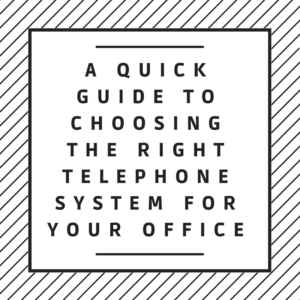In today’s ever-competitive business world, even small companies can stand to benefit from having a reliable telephone system. After all, it is the lifeline of your business to suppliers, customers, partners, and the rest of the world. And, yes, even in the age of the internet, a telephone system is still the easiest and the most efficient way to communicate both internally and externally.
With that said, choosing the right business telephone system for your office is a crucial decision, and even a slight mistake can have far-reaching financial and operation ramifications. That’s why we have come up with this quick guide to help you select the perfect telephone system for your small office communication needs.

First Things First: Why do I Need a Telephone System?
If you are running a small office, the chances are that you are already on a tight budget. Even so, you still need to reach out to the best Avaya distributor in UAE to hook you up with the best system. Here’s why a telephone system is a no-brainer for today’s small offices.
- Never miss a chance: Thanks to the night-mode, a telephone office system can send after-hours calls to voicemail.
- It helps with holding and transferring calls between offices/handsets
- Comes with soothing music that keep callers on hold engaged and entertained
- Check voicemails from any phone anywhere
- Scalable: you can add more handsets to the system as you expand your business
Important Steps to Choosing a Telephone System for your Office
Step #1: Figure Out How Many Extensions and Trunks you’ll need
First up is to determine the number of extensions and trunks your office requires. In case you are wondering, a trunk is a line/cord connecting your office to the outside world. The rule of thumb is that a small, quiet office can do with one trunk (line) for every five staff members. However, if your business is sales or marketing focused, you might want to wind that down to one trunk per each or two office staff. Besides, the more trunks you invest in the more future-proof your office is.
Extensions, on the other hand, are handsets or internal lines you’ll need for your office. Remember that each member of your office staff needs an extension as well as one for every room in your office, not forgetting the reception or help desk. Again, you need to invest in more extensions to future-proof your office.
Step #2: Which is the best for your Office – VOIP, Digital or Hybrid?
VOIP, an abbreviation for Voice Over Internet Protocol, are state of other art phone systems that make use of your internet connectivity to receive and make calls. It’s sort of like Skype, but much more robust and professional. The significant upside of VOIP telephone systems is that they allow you to make calls, especially international calls cheaply. The downside, however, is that its reliability is tied to your internet connection. As such, if your internet is down, your telephone system will be too! If you decide to go with VOIP, be sure to have a cell phone handy.
Digital telephone systems are quite popular and available from leading AVAYA distributor in UAE. They engineered to receive signals from traditional copper wires and send them to your office handsets. The trunk-type for digital systems is often called POTS or PSTN line. Because are they are popular; digital telephone systems tend to be quite reliable for any office.
A hybrid telephone system brings the better of the two worlds – VOIP and digital. Oftentimes that means hybrids are both flexible and reliable. How so? It’s designed such as that when the internet goes down; the signals are rerouted through POT lines. No matter how you look at it, a hybrid business telephone system is an excellent choice for a small office.
Step #3: Consider GSM Gateway
GSM is essentially the technology behind your cell phone. As such, GSM gateway is another mobile phone that allows your office handsets to get connected to the phone network. It comes with a port or more for SIM cards to be inserted. Once they are set up, GSM gateways work like any other trunk line phone system.
GSM gateway pros include that fact that service providers offer cheap plans as well as free calls to a specific set of numbers. If you want to make interoffice calls, for instance, you will not be charged, unless you make one to an outside number.
Step #4: Think about Setup Costs and Support
When you commission a reliable Avaya distributor in UAE, the odds are that you’ll need a technician to set the system up. That’s why you want to work with a distributor who offers low-cost, if not free installation services. More importantly, you want a system that’s easy to configure, maintain, and upgrade. Even better, the distributor or manufacturer should offer convenient support system 24/7.
These are just but a few options you have when it comes to choosing the right telephone system for your office. If you tend to be mobile, you might want to check out portable phone systems. Also known as DECT phones, this system has built-in features such as call transfer, music on hold, and much more.
You can also stay updated by subscribing to iTechCode.